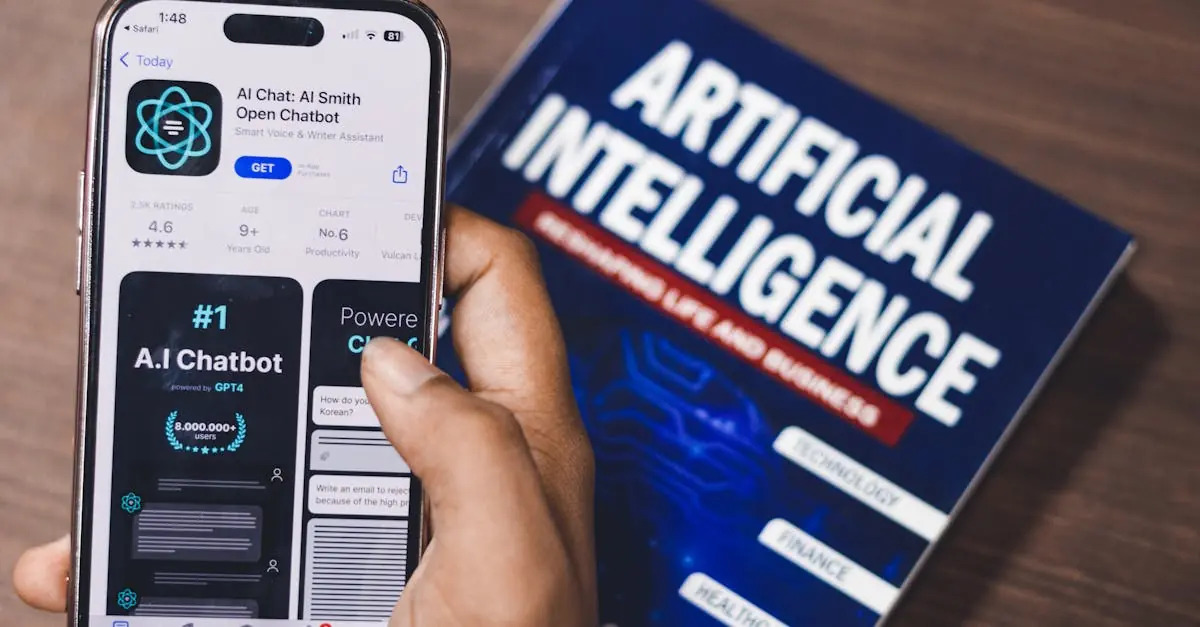Table of Contents
ToggleIn a world where smartphones are practically an extension of ourselves, mobile artificial intelligence projects are popping up faster than you can say “Siri, what’s the weather?” These innovative ventures are transforming how we interact with technology, making it smarter, more intuitive, and just a tad bit sassy. Whether it’s an app that predicts your coffee cravings or one that helps you find your lost keys (again), the possibilities are endless.
Overview of Mobile Artificial Intelligence
Mobile artificial intelligence transforms how users engage with their devices. This technology streamlines tasks like navigation, communication, and personal organization. Various applications rely on AI algorithms to learn from user behavior, tailoring experiences based on preferences.
Smart assistants exemplify mobile AI’s capabilities. They respond to voice commands and provide relevant information, enhancing productivity for users. Additionally, predictive text features adapt to writing styles, making communication more efficient.
Image recognition technology has also gained ground in mobile AI. Applications can now identify objects and landmarks, assisting users in exploring their surroundings. These advancements provide a more immersive experience while promoting convenience.
Numerous mobile AI projects focus on improving user security. Biometric authentication uses facial recognition and fingerprint scanning to safeguard personal information. Such measures ensure increased safety for users on their devices.
Healthcare apps equipped with mobile AI analyze user symptoms and recommend actions. These tools make health management accessible, enabling individuals to monitor their well-being effectively. Users benefit from tailored advice based on their unique circumstances.
Real-time language translation services enhance communication across different languages. By utilizing mobile AI, these applications facilitate connections between people worldwide. Immediate translation fosters understanding and collaboration in diverse settings.
As mobile artificial intelligence continues to evolve, its applications expand further. Innovations emerge regularly, shaping how users interact with technology. The seamless integration of AI into daily life highlights its growing significance.
Key Mobile Artificial Intelligence Projects
Mobile artificial intelligence projects play a crucial role in enhancing user interaction with technology. Several notable projects exemplify this evolution.
Project A: Description and Features
Project A focuses on smart personal assistants that utilize natural language processing. These assistants enable users to manage schedules seamlessly, set reminders, and answer questions intelligently. Features include voice recognition technology allowing for hands-free operation and machine learning algorithms that adapt to individual preferences. Users appreciate the personalized experience that grows more insightful over time. By analyzing user interactions, the app enhances its ability to predict future requirements effectively.
Project B: Use Cases and Impact
Project B has transformed healthcare management through its symptom-checking capabilities. Users can input symptoms and receive immediate assessments based on vast medical databases. The mobile app generates personalized recommendations for further action, such as scheduling appointments or accessing telehealth services. Results demonstrate significant improvements in user health management, with many reporting quicker resolutions to health issues. Additionally, the project fosters preventive care by encouraging regular health check-ins, ultimately reducing hospital visits.
Advantages of Mobile Artificial Intelligence
Mobile artificial intelligence offers significant benefits that enhance device functionality and user interaction. These advantages manifest through improved user experience and greater operational efficiency.
Enhanced User Experience
Mobile AI personalizes interactions by adapting to user habits. Apps learn individual preferences, providing tailored recommendations that simplify decision-making. Smart assistants utilize conversational interfaces, ensuring seamless communication that feels intuitive. Users enjoy voice recognition features that respond accurately to commands, enhancing convenience. Image recognition technology empowers users to identify objects and landmarks quickly, a great aid for exploration. With mobile AI, applications become more engaging, making technology feel less like a tool and more like a companion.
Increased Efficiency
Efficiency boosts across various tasks represent another advantage of mobile AI. Automated processes save users valuable time by managing schedules and organizing information intelligently. Smart assistants can handle multiple inquiries simultaneously, thus minimizing the need for repetitive actions. Predictive text capabilities streamline messaging and writing, enhancing communication speed. Health applications analyze symptoms rapidly, allowing for swift decision-making regarding care. Improved navigation systems enable quicker travel routes, ultimately reducing wasted time on the road. By integrating mobile AI, users experience smoother and more productive interactions throughout their day.
Challenges in Mobile Artificial Intelligence Development
Mobile artificial intelligence faces various challenges that can affect its effectiveness and adoption.
Technical Limitations
Performance issues often arise in mobile AI due to limited processing power and memory. Developers encounter difficulties when designing complex algorithms that require substantial resources. Battery consumption remains a concern, as intensive AI tasks drain power quickly after high use. Latency in data processing can hinder real-time responsiveness, impacting user experience. Connectivity problems also pose challenges in areas with weak signals, resulting in a dependence on stable internet connections.
Ethical Considerations
Privacy concerns dominate the ethical landscape of mobile AI development. Personal data collection raises questions about user consent and data security. Bias in AI algorithms can lead to unfair treatment of specific user groups, negatively affecting interactions. Transparency in how AI operates remains essential, as users expect clarity regarding the decision-making processes behind mobile applications. Developers must navigate these ethical challenges carefully to foster trust and ensure responsible use of AI technologies.
Future Trends in Mobile Artificial Intelligence
Emerging advancements in mobile artificial intelligence point toward a landscape rich with potential and innovation. Enhanced personalization features will rank at the forefront, enabling mobile devices to adapt increasingly to user behaviors. Expect to see smarter recommendations based on historical data, which could lead to significant shifts in how individuals interact with technology daily.
Predictive analytics stands to transform how apps function. New algorithms will process data faster, driving the development of applications that anticipate user needs. Automated communication tools will likely enhance user engagement through natural language processing capabilities, improving interactions with smart assistants.
Healthcare applications will see continued evolution. Leveraging machine learning, these tools may offer improved symptom analysis and real-time health monitoring. Users could benefit from more proactive health management solutions, ultimately leading to better outcomes.
Another area of growth includes augmented reality integration. Mobile AI can enhance user experiences by overlaying digital information onto the real world. This technology could extend beyond gaming, offering practical applications in education and retail environments.
Security measures will also advance significantly. Biometric authentication methods, such as facial recognition and fingerprint scanning, will become standard, enhancing user privacy. Trust in mobile AI systems is essential, thus emphasizing the commitment to ethical practices in data collection and algorithm transparency.
Challenges remain, particularly concerning resource limitations and ethical dilemmas. Developers are under pressure to create robust applications that function effectively across various devices while also respecting user privacy. As progress continues, striking a balance between innovation and responsibility will be crucial for future developments in mobile artificial intelligence.
Mobile artificial intelligence projects are reshaping how individuals interact with technology in profound ways. As these innovations continue to evolve they promise to enhance user experience and streamline daily tasks. The potential for improved personalization and efficiency is vast with applications spanning healthcare navigation and communication.
While challenges exist such as technical limitations and ethical concerns developers are actively working to overcome these hurdles. The future of mobile AI looks bright with advancements in predictive analytics and augmented reality on the horizon. By striking a balance between innovation and responsibility the impact of mobile AI on daily life will only grow stronger.




